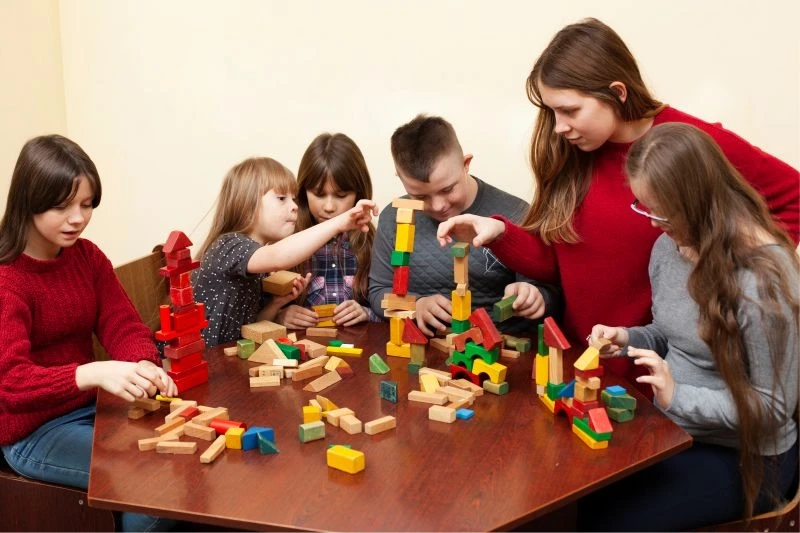Positive social skills are crucial for preschoolers' social and emotional development and can have long-term benefits for their academic and personal success.
Building relationships: Positive social skills help preschoolers build relationships with their peers and adults. These skills include sharing, taking turns, and cooperating, which are essential in one of the best schools near GolfGarden for building friendships and working collaboratively.
Emotional regulation: Preschoolers are still developing their emotional regulation skills, and positive social skills can help them express their emotions in healthy ways. Children who have positive social skills are better able to communicate their needs and feelings, which can reduce conflicts and promote positive interactions with others.
Self-esteem: When preschoolers have positive social skills, they are more likely to feel confident and secure in their interactions with others. This can lead to greater self-esteem, which is important for their overall social and emotional development.
Success in school: Positive social skills are linked to success in school, as children from pre primary schools in Kolkata who are able to work well with others are more likely to participate in classroom activities and engage in learning. They are also less likely to experience behavioural problems, which can affect their academic performance.
Social skills you can teach your child
There are many social skills that you can teach your child to help them develop healthy relationships and interact positively with others. Here are some important social skills you can teach your child, as per one of the top schools near GolfGarden:
Active listening: Teach your child to listen attentively when others are speaking, and to ask questions to show interest and understanding.
Empathy: Help your child develop empathy by encouraging them to imagine how others might be feeling in different situations.
Respect: Teach your child to respect others, their opinions, and their personal space.
Cooperation: Encourage your child to work cooperatively with others and to consider the needs of the group as a whole.
Conflict resolution: Teach your child to resolve conflicts in a calm and respectful manner, and to seek out compromises and solutions that work for everyone.
Social cues: Help your child to read social cues and understand nonverbal communication, such as body language and facial expressions.
Self-control: Teach your child to control their emotions and impulses in social situations, and to express their feelings in appropriate ways.
Gratitude: Encourage your child to show gratitude and appreciation for others, and to acknowledge acts of kindness and generosity.
Friendship skills: Help your child develop skills for making and maintaining friendships, such as sharing, compromising, and being a good listener.
Assertiveness: Teach your child to assert themselves in a respectful and confident manner, and to communicate their needs and wants clearly and effectively.
Ways to improve your child's social skills
Improving social skills takes time and practice. Be patient and supportive, and your child will develop the skills they need to navigate social situations successfully. There are several ways to improve your child's social skills:
Encourage playdates: Organize playdates with other children to help your child develop social skills, learn how to share, and communicate with others.
Teach empathy: Teach your child to understand other people's feelings and perspectives. Encourage them to put themselves in other people's shoes and consider how their actions might impact others.
Model positive social behaviour: Children learn by watching and imitating others, so it's important to model positive social behaviour. Practice good communication skills, active listening, and problem-solving.
Role-play social situations: Help your child practice social situations through role-playing. This can include things like introducing themselves to others, making conversation, and resolving conflicts.
Provide opportunities for group activities: Encourage your child to participate in group activities, such as sports teams or clubs, to help them develop teamwork and collaboration skills.
Teach assertiveness: Help your child learn how to express their opinions and needs assertively, without being aggressive or passive. This can help them to communicate effectively and stand up for themselves in social situations.
Encourage positive self-esteem: When children feel good about themselves, they are more likely to engage in positive social interactions. Encourage your child's strengths and celebrate their achievements.
How schools can encourage positive social development
Pre primary schools in Kolkata can encourage positive social development in several ways, including:
Create a positive school culture: The best English medium schools near Garia promote a positive school culture by creating an environment that is welcoming, inclusive, and respectful of all students. This can be achieved through initiatives such as school-wide assemblies, class discussions, and social events.
Foster positive relationships: Teachers and school staff can encourage positive relationships between students by promoting teamwork and collaboration. Group projects, peer mentoring programs, and cooperative learning activities can help students develop positive social skills.
Provide opportunities for leadership: Schools can provide students with opportunities for leadership through student councils, extracurricular activities, and community service projects. These experiences can help students develop confidence and build their social skills.
Encourage empathy and kindness: Schools can promote empathy and kindness by incorporating social-emotional learning (SEL) programs into the curriculum. These programs teach students about emotions, empathy, and conflict resolution.
Address bullying: Schools must take bullying seriously and have clear policies in place to address it. Students should be encouraged to report bullying and feel safe doing so. Schools can also implement anti-bullying programs and initiatives to promote positive social interactions.
Celebrate diversity: Schools can celebrate diversity by promoting cultural awareness and appreciation. This can be achieved by celebrating cultural holidays, hosting cultural events, and providing opportunities for students to learn about different cultures.
English medium schools near Garia encourage positive social development by creating a supportive environment that promotes social-emotional learning, encourages positive relationships, and celebrates diversity.


